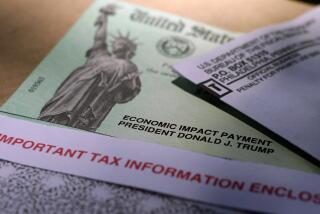In Travelers Checks, ‘Refundability’ Is Key
- Share via
Once they’ve decided that travelers checks are better on trips than cash, many people just take whatever brand their bank offers free. Does it make any difference whose they are?
It may. Tourists complain that banks in cities from Buenos Aires to New York may refuse to cash some, if not all, brands. Correspondents for Conde Nast’s Traveler magazine recently caused a stir when they “lost” several brands of checks in Boston, London, Warsaw and Piacenza, Italy. One company’s representative said, “Come back another day.” Another, far away at a phone center, said, “Gosh I’m sorry, but I’m unable to help you on this end.” Only American Express replaced checks without fail, whatever the day or hour.
“Refundability,” which really means replacement of lost or stolen checks, is not the only concern, but it’s the hottest since last year, when American Express threw into a routine and uninspired marketplace its new promise of hand-delivered refunds, “anywhere you want.” Customers need only call. “It really means a lot to people to have their vacation uninterrupted,” says American Express spokeswoman Laura Gross in New York. “If they want to wait in the phone booth, we’ll even get it to them there!”
American Express’ aggressive new campaign is its response to increased competition in the business. Some comes from other payment systems--more credit cards now accepted abroad, more cash machines and cash machine usage. Some comes from increasing sales of other travelers checks--not just those of big banks such as Barclays, Citibank and Bank of America but of cards bearing the familiar logos of MasterCard and Visa, networks linking many different financial institutions.
American Express checks, around almost 100 years, are still tops, having sold $24 billion worth last year, but the MasterCard and Visa checks ($8.5 and $11.5 billion respectively) are being energetically promoted. Actually, they’re issued by big banks, which enjoy the float between purchase and redemption, and sold by third parties (often smaller banks), which get a commission: MasterCard and Visa just provide the logos and some administration. But given all their member institutions, they sound big, boasting of 65,000 sales locations and 200,000 refund locations (MasterCard) or 68,000 sales and 300,000 refund locations (Visa).
They’re also pressing banks to sell these checks instead of American Express, already the dread competition with bank cards. “We say that by selling American Express products, they’re supporting a direct competitor,” says Visa spokesman Gregory Holmes in San Mateo, Calif.
The stirred-up competition can only have good effects on the consumer’s three basic concerns about travelers checks--their availability, refundability and acceptance around the world. Already a good two-thirds of travelers checks, even American Express, are “fee-free,” promoted as a service to customers.
Refundability is basically a question of ease and responsiveness, particularly in a strange place. People buying travelers checks are buying “peace of mind and insurance,” says Dennis Stevens, vice president of marketing for American Express Travelers Cheques, “but not insurance against loss of the money. You’re insuring the ability to continue your vacation.” The standard, therefore, was to boast of pleasant service and the number of refund locations around the world.
Now American Express has added speed to the equation, realizing that a refund “has to be quick,” says Stevens, “or it doesn’t really accomplish what the consumer needs to move on his merry way.” The telephone call in which customers can now summon American Express to them is the key, making the number of office locations irrelevant, or giving American Express an unbeatable number of them--”anywhere you can find a phone,” say the ads, or the estimated 570 million phones in the world.
This is a potentially dangerous campaign: Anyone who makes such an extraordinary promise had better be unfailing in the fulfillment. But behind the 12 toll-free lines worldwide are nine round-the-clock refund operating centers, which authorize and arrange full replacement, offer the hand delivery as a matter of course, and dispatch the courier, a fleet-footed contract player who has been equipped with check forms. Not everyone needs such service, but more than 14,000 people in 120 countries took it last year.
Those on other systems are still dependent on local offices, which may be numerous, but are mostly banks (MasterCard also has Thomas Cook travel offices), and not always open. If it’s after hours, the 24-hour phone operators, who may be on another continent, “direct the person to where he can go the next day,” says F. David Brangachio, vice chairman of MasterCard Travelers Cheques. In a real emergency, says Holmes, when a customer is “far away, or incapacitated, or absolutely out of cash,” Visa will arrange Western Union or courier delivery.
Visa’s refund locations, moreover, can’t replace more than $1,000 to $1,500 worth of checks without the issuing bank’s permission. Some MasterCard locations, says Brangachio, can offer only $500 “to tide you over to the next destination.”
Even as refundability improves--and American Express’s hand delivery system will doubtless have competition soon--the promise of acceptance could fall apart. Travelers checks are not always as good as cash now--particularly at financial institutions in American cities, and even institutions on the MasterCard and Visa networks.
Check fraud doesn’t seem to be the problem: Industry executives say the general rule of “watch and compare”--watch the person countersign, compare the signatures--is usually safeguard enough. It’s banks themselves, increasingly cautious, or mean-spirited, or both, who refuse to cash travelers checks or anything else for people who aren’t regular customers, or who may charge a substantial fee to do so.
Sounds like there’s still room for innovation in this little field.
More to Read
Sign up for The Wild
We’ll help you find the best places to hike, bike and run, as well as the perfect silent spots for meditation and yoga.
You may occasionally receive promotional content from the Los Angeles Times.






